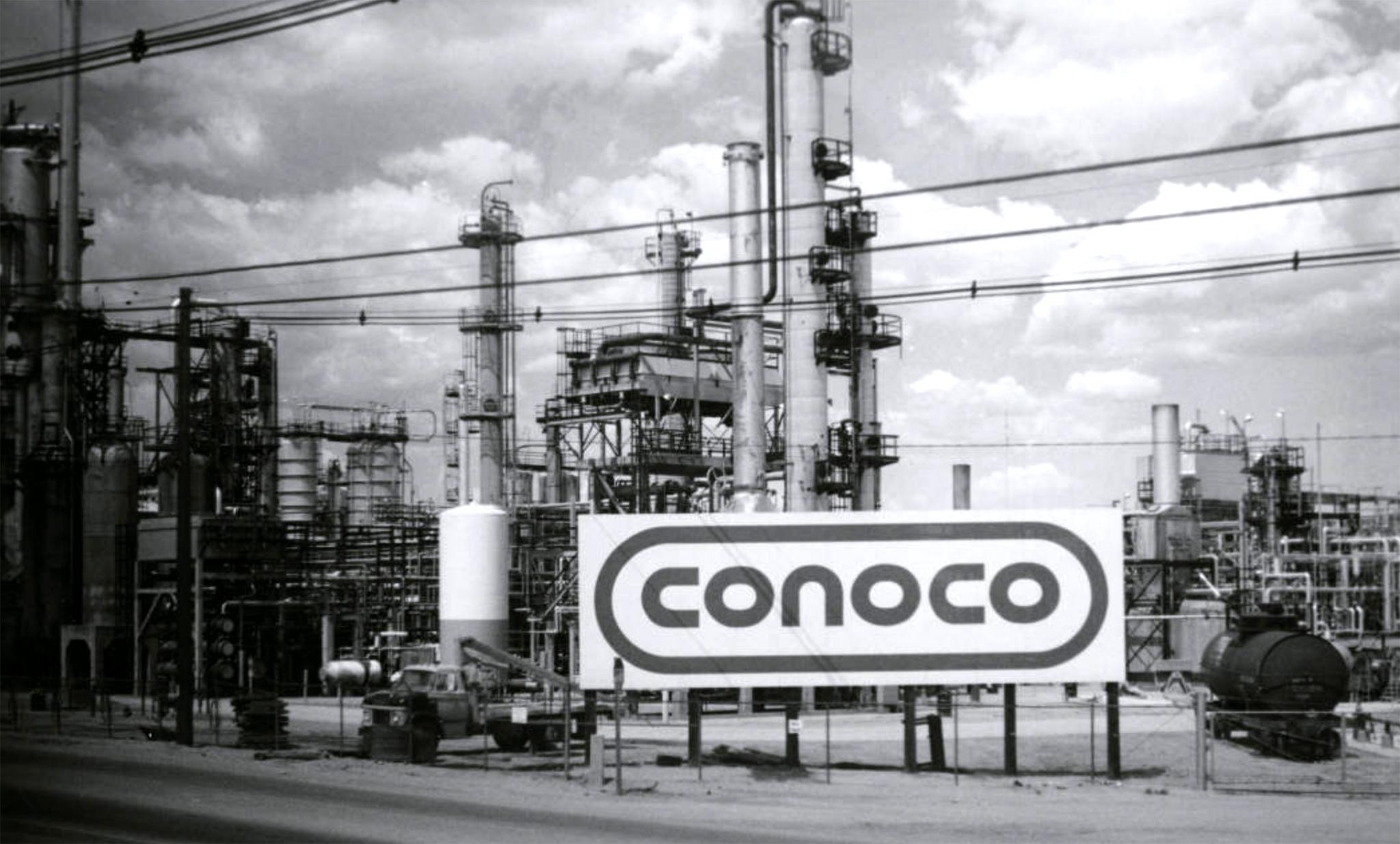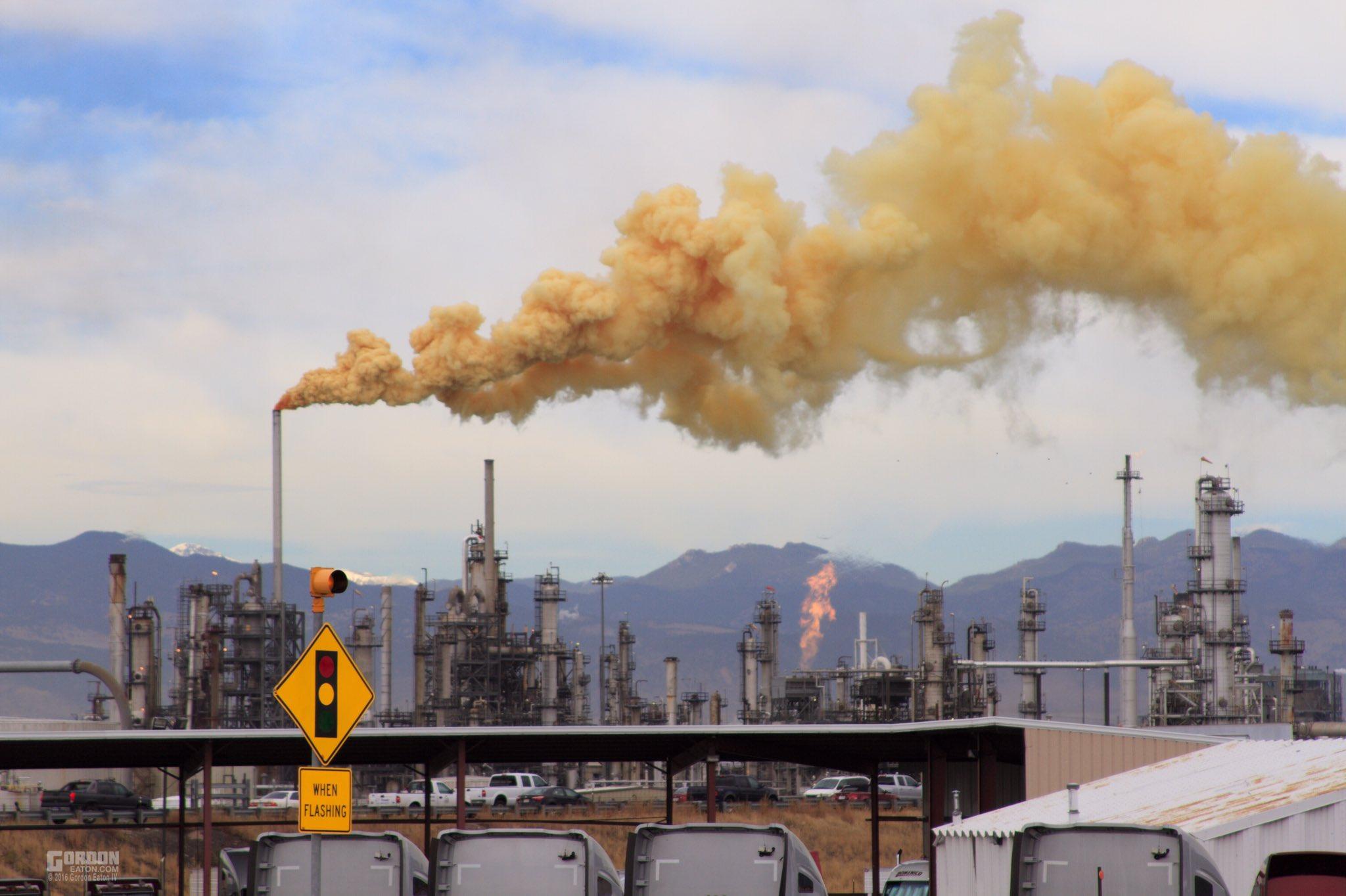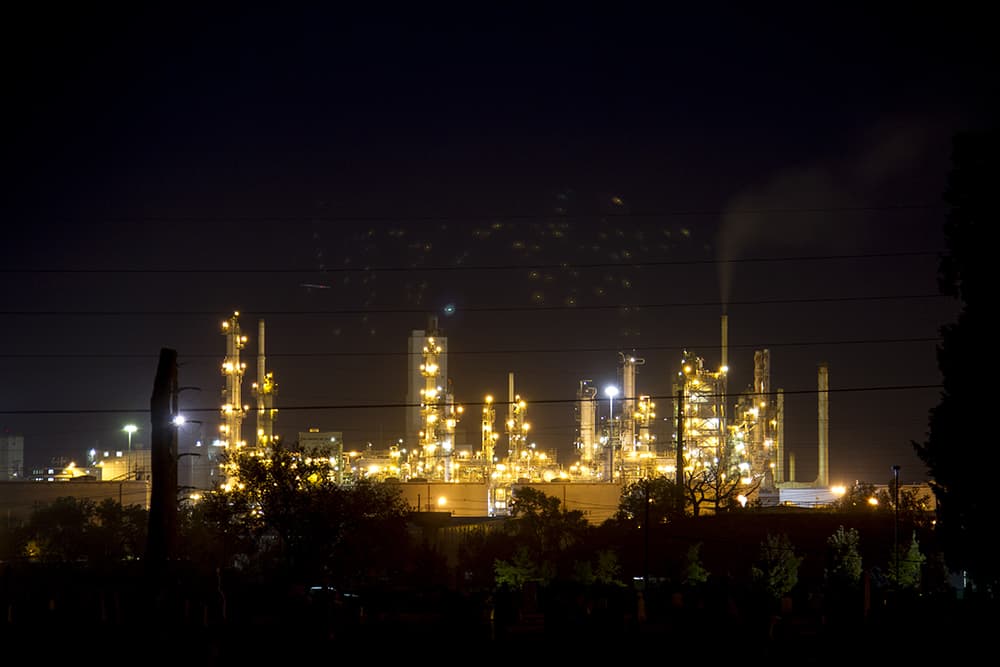For Brighton Boulevard Week, we've mostly discussed the street's southernmost reaches, the area below I-70 that was once a haven for industry. But north of that, just over the line separating Denver and Commerce City, the boulevard is still very much industrial.
Past the old homes in Elyria Swansea, just beyond the city's first cemetery, is the site of massive oil refining operations that date back to the 1940s.
Twenty years ago, the plants now owned by the Canadian company Suncor were owned by two separate companies. The refiners bought one from ConocoPhillips in 2003. They bought the second unit, just across the street, from Valero Energy Corp. in 2005. These sites were the only two refineries in Colorado, so the twin purchases meant Suncor was taking over the state's entire industry.
Operational troubles and the sites' proximity to north Denver's neighborhoods have made Suncor a target for residents beating the drum of environmental justice. But City Councilwoman Candi CdeBaca, who's long offered a loud voice of advocacy for Globeville and Elyria Swansea, said she's frustrated more people haven't paid attention to the refiner's activity, especially as the state deliberates on renewed air quality permits for both sites.

Awareness of environmental issues in north Denver and across the city are changing.
Public protests demanding urgent solutions for the global climate crisis have ticked up in the city in recent months. But there's something happening beyond the Greta Thunberg-ification of climate action: gentrification.
Lloyd Burton is an attorney who ran the graduate environmental law program at the University of Colorado Denver's School of Public Affairs and founded the Sierra Club's environmental justice team. As demographics shift, he said, so will public awareness.
"Gentrification is going to inevitably draw more attention to this," he said.
Hip Denver is creeping towards Suncor as the stretch of Brighton Boulevard south of I-70 flips from body shops to chic apartments. Mission Ballroom, the massive music venue that opened in August, planted a flag of cool on Brighton less than two miles from the refinery. The National Western Complex, which is even closer, is getting a reboot that aims to draw visitors year round; one attraction is a series of educational centers run by Colorado State University that will teach kids about the environment.
Suncor's Commerce City operations don't have a great record, but it's hard to compare them to anything else.
In their public comments on Suncor's permit renewals -- they have two, one for each site -- advocacy group EarthJustice described the twin refineries as "one of the largest sources of air pollution in the Denver-metro area." Public comment ended on the matter in August 2017; CDPHE's decision is still pending.
In 2019 alone, Suncor's two operations accrued 75 separate permit "upsets," according to Colorado's Department of Public Health and Environment (CDPHE). Upset reports are filed for all kinds of reasons. Sometimes, a regulated chemical that's released into the air exceeds concentrations allowed by Suncor's permits. Other times, emissions become more opaque than they're supposed to be.
For a story published last March, CDPHE's Air Pollution Control Division Director Garry Kaufmann said that upsets like these, while technically a violation, can sometimes be expected. These are huge, complicated processes. They usually work according to their permits when they're going at full speed, but emissions can spike when operations are starting up or shutting down.

The facility has endured some higher profile issues as well. In 2016, a plume of yellow smoke eked out of one of its smokestacks. It was visible throughout the metro area, and some nearby residents received reverse-911 calls telling them to shelter in place.
Every few years, CDPHE and Suncor come to a settlement to address punishment for these violations. They total in the millions.
According to CDPHE, the company has been assessed more than $3.6 million since 2010. Much of that money goes into supplemental environmental projects like solar gardens or energy efficiency improvements for locals.
But it's hard to judge if Suncor is necessarily a bad actor since its operations are the only refineries in Colorado.
Shannon McMillan, CDPHE's compliance and enforcement manager, said that's "a difficult question to answer."
"Suncor is the only petroleum refinery in Colorado and one of the most complex and highly regulated sources of air pollution in the state," he said in a prepared statement. "As such, it's difficult to compare Suncor's violations and penalties to other sources in Colorado."
The lack of awareness has made it hard for activists to make changes.
Beyond their issues with existing rules, the Sierra Club's Burton said many of the compounds that Suncor releases have no set limits. The state has tied many of the refinery's regulations to federal standards, which he said are lacking and unlikely to be revised under President Trump's administration.
Last May, Rep. Diana DeGette introduced a federal bill directing agencies to make rules for hydrogen cyanide, a chemical that can cause immediate health problems in high doses. Suncor is essentially allowed to set their own limits for hydrogen cyanide based on what it expects it will emit.
Burton said Gov. John Hickenlooper's administration wasn't interested in setting standards for these unregulated chemicals at the state level, but he's hopeful Gov. Jared Polis will point the state in another direction. He'd like to see higher fines that are assessed at more frequent intervals if the company does not comply.
"Those fines that they're paying now," he said, "they're fleabites and they're obviously having no deterrent effect on their behavior whatsoever."
While Burton said he thinks the fossil fuel industry is "is pretty much doomed" in the next 30 years as renewable energy becomes cheaper and more electric vehicles and appliances become available, he still wants to pursue action against Suncor.
"In the meantime the plant needs to be safer," he said. "It needs to be safer and cleaner and it needs to pose less of a threat to the neighbors and to the people who work there."
A spokesperson for Suncor said the company "continually monitors" its operations and emissions: "We want to be part of Colorado's energy future, while making sound investments and driving environmental improvements."
CdeBaca said Suncor is a "huge part" of the air quality issues facing her community, adding: "It's sad that nobody's ever addressed it at the city level here in Denver."
One reason the city has not dealt squarely with Suncor, specifically, is that it sits just outside city limits.
"The city of Denver deflects any responsibility at all for doing anything because its not in our county," she said. "That's been historically the issue."
She said the city council of Commerce City has been unwilling to clamp down on Suncor. But she added she's watching their municipal elections closely. Next month, Commerce City will vote on new city councilors. CdeBaca said she hopes the council will "flip," particularly if candidate Lucy Molina, who lives close to the refineries, wins a seat. She said she's already been in touch with legislators in Aurora, too, to form a coalition. If she finds an ally in Commerce City, she's hopeful they can pursue regional solutions to air quality.
Longtime north Denver residents, who have experienced higher rates of emergency room visits for cardiovascular disease, diabetes, obesity, and asthma, have been complaining about air quality for a years. CdeBaca led a failed attempt to derail the I-70 highway expansion, fearing increased emissions as more cars fill the wider highway.
A common refrain from activists during that time was that the city and state might have listened more closely if more residents there were white. With the area's potential gentrification, that may happen whether residents like it or not.













